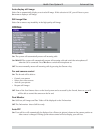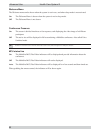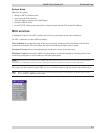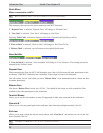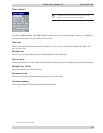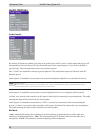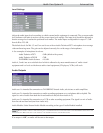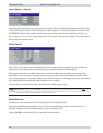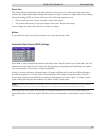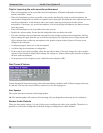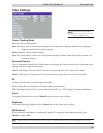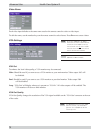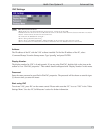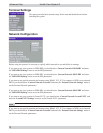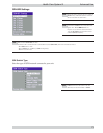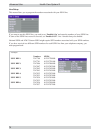
Health Care System III
67
Advanced Use
Automatic Gain Control (AGC) Settings
Select ‘On’ to allow automatic adjustments (Automatic Gain Control) of audio levels. When ‘On’, the AGC
maintains the audio signal level at a fixed value by attenuating strong signals and amplifying weak signals.
Very weak signals, i.e. noise alone, will not be amplified.
Example: In most conferences, the participants will speak at different levels, and be at different distances
from the microphones. As a result, some of the participants will be harder to hear than others. The AGC
corrects this problem by automatically increasing the microphone levels when “quiet” or “distant” people
speak, and by decreasing the microphone levels when “louder” people speak.
TO ENSURE CORRECT BEHAVIOUR OF THE AGC, IT IS CRUCIAL THAT THE LEVELS ON THE INPUT CONNECTORS ARE ADJUSTED CORRECTLY
USING THE AUDIO INPUT LEVEL SETTINGS. THE AGC WILL NOT COMPENSATE FOR SEVERE MISADJUSTMENT OF INPUT LEVELS.
When applying a weak signal in the presence of strong background noise, the leveller might amplify the
background noise as well as the signal. Therefore, in noisy environments, it is advisable to turn the leveller
off.
Room Size
This setting allows optimization of the echo canceller to the acoustic size of the room. Hard walls, many
windows etc. might require higher settings than expected. Carpets, curtains etc. might require lower settings.
Adjust the setting (NOTE: on the far end) if one of the following symptoms occur:
• There is still some echo of your own audio. Increase the setting.
• The system adapts slowly to acoustic changes in the room. Decrease the setting.
After a change, the system will need a few seconds to re-adjust.
Motion
If you experience echo caused by movements in the room, increase the value.
NOTE



